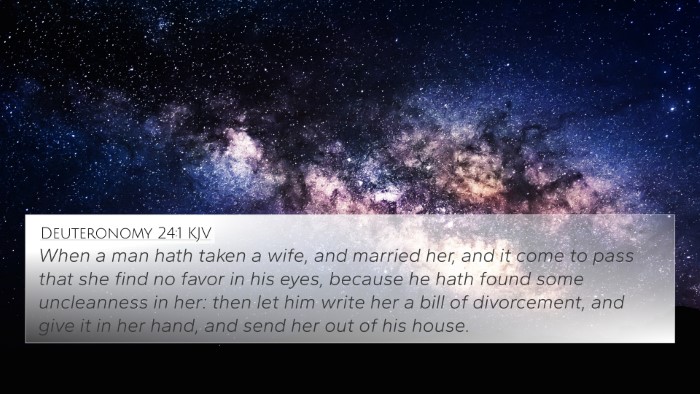Understanding Deuteronomy 22:13
Verse: Deuteronomy 22:13 - "If any man take a wife, and go in unto her, and hate her,"
This verse addresses the issue of a husband who accuses his wife of not being a virgin at the time of their marriage, leading to serious legal and social implications in ancient Israelite society. The underlying themes revolve around integrity, the sanctity of marriage, and the importance of truth in familial relationships.
Commentary Insights
- Matthew Henry: Matthew Henry emphasizes the seriousness of a husband's accusation against his wife. He explains how this verse underscores the expectations of marital fidelity and the consequences of false accusations. Henry suggests that the law aims to protect women from unjust treatment and to uphold a moral standard within the community.
- Albert Barnes: Barnes highlights the cultural context of the law. He elucidates the protection it affords to women, ensuring that they are not unfairly maligned. Barnes notes that the provision serves both to preserve the sanctity of marriage and to cultivate a sense of responsibility among men regarding their marital vows.
- Adam Clarke: Clarke delves into the legal processes mandated by the verse, explaining the necessity of evidence in accusations. He points out that the woman's honor is paramount, and the law serves to dispel any baseless claims against her character, thereby emphasizing the importance of maintaining personal and social integrity.
Bible Cross-References
Deuteronomy 22:13 is interconnected with various scriptures that illuminate the themes of marriage, fidelity, and the judicial process in Israelite society. Below are Bible cross-references that expand on these themes:
- Exodus 20:14: "Thou shalt not commit adultery." - This commandment underscores the sacredness of marital fidelity.
- Leviticus 18:20: Addresses prohibitions against unlawful relationships, reinforcing the importance of sexual morality within marriage.
- Numbers 5:11-31: Describes the ritual of the bitter water for a woman accused of adultery, illustrating the gravity of such accusations and procedures for proving innocence.
- Matthew 1:19: Joseph's consideration of divorcing Mary reflects the serious implications surrounding marriage and accusations of infidelity.
- John 8:4-5: The story of the adulterous woman emphasizes the topic of judgment and mercy within marriage.
- Proverbs 6:32: "But whoso committeth adultery with a woman lacketh understanding: he that doeth it destroyeth his own soul." This verse warns about the foolishness of marital unfaithfulness and its consequences.
- Ephesians 5:25: "Husbands, love your wives, even as Christ also loved the church, and gave himself for it." This New Testament instruction provides a broader understanding of the ideal marital relationship.
Thematic Connections
The verse also connects with a larger biblical narrative regarding relationships, law, and morality:
- Thematic Bible verse connections: The verses that address fidelity, such as 1 Corinthians 6:19-20 which discusses honoring God with our bodies, further tie into the theme of how actions within a marriage reflect broader moral standards.
- Comparative Bible verse analysis: Comparing this verse with Matthew 5:27-28, where Jesus expands the definition of adultery to include lustful thoughts, highlights the holistic understanding of marital fidelity in scripture.
- Scriptural cross-referencing: The law concerning false accusations in Deuteronomy 19:15-21 supports the theme by emphasizing the need for witnesses, ensuring justice is served without prejudice.
Conclusion
Deuteronomy 22:13 serves as a pivotal verse in understanding biblical teachings on marriage and integrity. Through cross-referencing related scripture, believers can gain a deeper appreciation of the gravity of marital fidelity and the societal implications of actions taken within that sacred union.








